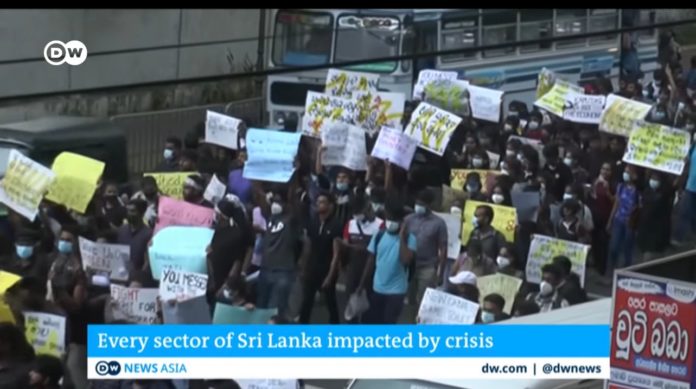The Sri Lankan government announced on Tuesday a temporary suspension of repayment in all external debts of about $51 billion due to the worsening economic crisis in the country caused by the Covid-19 pandemic and the Ukraine war.
“We have lost the ability to repay foreign debt. It has come to a point that making debt payments are challenging and impossible,” Central Bank Governor Nandalal Weerasinghe said at the media briefing.
Sri Lanka’s foreign reserves stood at $1.93 billion last month, but it has around $4 billion in foreign debt payments that are due this year, according to BBC.
Half a million people have sunk into poverty since the pandemic, with rising costs forcing many to cut back on food, the Guardian reported.
Hundreds of thousands have been protesting throughout the country for more than a week urging President Gotabhaya Rajapakse and his government to resign immediately.
One Twitter user said, “This is how the end game plays out. The weakest die first. And every weak currency that dies leaves behind a smaller pool of currencies that are doomed to the same fate.”
The Independent reported:
Sri Lanka has announced an unprecedented default on all its external debt worth $51bn amid the worsening economic crisis afflicting the island nation.
The country’s finance ministry said in a statement on Tuesday that the impacts of the pandemic and the Ukraine war made it “impossible” to pay its creditors, including foreign governments, and that the government would instead prioritise preserving its dwindling foreign currency reserves.
“Recent events, however… have eroded Sri Lanka’s fiscal position [to the point] that continued normal servicing of external public debt obligations has become impossible,” it said in a statement.
“A comprehensive restructuring of these obligations will be required,” it added.
The South Asian country has seen mass protests against the government in recent weeks as it suffers fuel and food shortages, resulting in inflation, shortages of many basic necessities and hours-long power cuts.
The country said it is waiting for a bailout from the International Monetary Fund to be able to meet its debt obligations, which the international body has already assessed as unsustainable. It is also seeking help from other countries.
The move breaks Sri Lanka’s “unblemished record” of paying its international debts since it won independence from British rule in 1948, the statement said.
The ministry also said the creditors are free to capitalise on interest payments due from Tuesday afternoon or opt for payback in Sri Lankan rupees.
The government had announced an emergency to tackle rising the demonstrations and shut down social media platforms for a brief period.
The crisis and protests prompted many cabinet members to resign. Four ministers were sworn in as caretakers, but many of the key portfolios are vacant.
Parliament has failed to reach a consensus on how to deal with the crisis after nearly 40 governing coalition lawmakers said they would no longer vote according to coalition instructions, significantly weakening the government.
Read more here.




